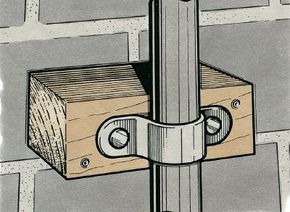How To Fix Noisy Pipes
Several different noises can come from your plumbing system. If you hear the sound whenever you turn on the water, the pipes are probably striking against something.
Banging pipes are much easier to cure if you can see them. Turn on the water and start looking for movement. Once you find the trouble, you can stop the pipe or pipes from hitting against whatever is in the vicinity. Even if the moving pipe is between the walls, you may be able to silence it without tearing your house apart. Just place padding or foam insulation at each end where the pipe emerges from behind the wall.
Advertisement
In many cases, the moving pipe is loose within its strap or U-clamp and is banging against the wall it's supposed to be secured to. To eliminate the noise, slit a piece of old garden hose or cut a patch of rubber and insert it behind the strap or clamp to fill in the gap. Pipes that strike against a masonry wall can be silenced by wedging a block of wood between the pipe and the wall. Nail the block to the wall with masonry nails or screws and attach the pipe to the block with a pipe strap.
In a basement or crawl space, galvanized steel pipes are typically suspended from the joists by perforated pipe straps. A long run of suspended pipe may move within the straps, strike against something, and create a racket. A block of wood strategically wedged along the run can eliminate the pipe's movement and the resulting noise. If you secure a pipe, don't anchor it so tightly that it can't expand and contract with changes in temperature. If you place a bracket on a pipe, install a rubber buffer between the pipe and the bracket. You can make such buffers from garden hose, foam rubber, rubber cut from old inner tubes, or even kitchen sponges.
You may find that supply pipes and drainpipes that run right next to each other are striking one another and creating a clatter. One solution to this problem is to solder the two pipes together. Another solution is to wedge a piece of rubber between them. If the vibration and noises are caused by water pressure that's too high, try reducing the water pressure.
If the knocking sound occurs only when you turn on the hot water, it means that the water heater is set too high. The noise is steam rumbling through the hot water system. Turning the heat setting down may silence the pipes. A pipe that's too small to begin with or that has become clogged with scale or mineral deposits can be a big noise problem. It's almost impossible to clean clogged supply pipes, and you must replace pipe that's too small if you want to stop the noise. You can diminish the sound level of clogged pipes considerably by wrapping them with sound-dampening insulation.
Drainpipes rarely clatter, but they can make a sucking noise as the water leaves the sink or basin. This sound means that a vent, such as the hole at the top edge of a bathroom sink, is restricted, or perhaps there's no vent at all attached to the drain. In either case, you have a potentially serious plumbing problem on your hands because a nonfunctioning or nonexistent vent can eliminate the water seal and allow sewer gas to back up into your home. If possible, run a plumbers' snake through the vent from the fixture or from the roof vent to eliminate any clogging. If there is no vent on the drain, install an antisiphon trap to quiet the noise and to prevent any problem with sewer gas. An antisiphon trap is available at a hardware or plumbing supply store.
The sound of banging pipes is sometimes called water hammer, but water hammer is a very specific noise issue. Find out how to bring it under control on the next page.
